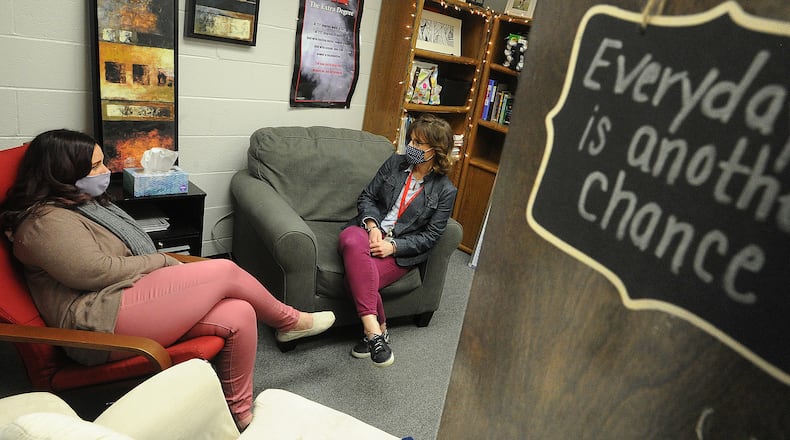The two incumbents are Thomas Kleptz and Susan Borchers. Two new candidates are Levi Fox and Theresa Packard.
The district has tried unsuccessfully in recent years to update aging classrooms for students through grade six and most recently voted to implement a controversial mask requirement as part of responding to COVID-19.
Incumbent Susan Borchers first was appointed to the board in summer 2017, then elected in 2019 to the rest of term. A retired chief information officer at Reliance Steel and Aluminum Co., Borchers and husband, John, have one daughter.
The district’s largest challenge is its aging schools, Borchers said.
“While it would be great to keep our beautiful buildings, doing so is not practical as it would prevent us from getting the current 42% funding contribution from the state” toward a building project, she said.
The district created a plan for new elementary schools and to add air conditioning at the high school, she said.
“We need to re-engage the community when the time comes to move forward,” she said.
Borchers said the district uses several ways to attempt to engage the community, but needs to explore other ways to increase participation.
Levi Fox, a finance manager, is making his first bid for the board. He served previously on the city board of park commissioners. He and his wife, Emily, have three sons.
New buildings are a top issue to him.
“In order to pass a levy, the district needs a complete plan. This plan must include details on the new site locations as well as what will happen to the property of existing sites,” Fox said. “If new buildings are built, then parents should know where their children will be going to school before they vote on a levy.”
Fox said the board also faces a curriculum challenge.
“We have to stop trying to indoctrinate our children with radical policies like Project 1619 and Critical Race Theory. It is impossible for the school board to know all of the content taught in our schools. Parents must make the administration and school board aware of unacceptable ideologies being taught to our children,” Fox said.
As the Dayton Daily News previously reported, critical race theory is an academic framework that is overwhelmingly not being taught at the K-12 level (the only mention of the theory reporters found was in a classroom in Montgomery County). The 1619 Project is a The New York Times Magazine project.
Thomas Kleptz has served on the Troy school board since 2015 and previously served on the Northmont schools board of education.
He is managing partner and owner of Turnstone Financial. He and wife, Melissa, have four children.
Kleptz pointed to financial stability, updated curriculum and the need to replace buildings as top issues.
“We need to continue to work with our local state representatives to ensure public education will receive sufficient funds that are calculated in a fair and equitable manner,” he said.
With curriculum, a new reading program was implemented at the elementary level and the junior high is looking at a complementary program, Kleptz said, and adding a new math program also is being reviewed.
Replacing the aging elementary buildings makes more sense than remodeling because the current buildings were not designed to meet today’s needs, Kleptz said.
“With two bond levies having failed, the board has listened to the community and is currently looking at building a fifth/sixth grade building that would be located in a neighborhood with a price that voters can support through a bond levy,” he said.
Theresa Packard works in marketing and communications at Buckeye Insurance Group, Piqua. She and her husband, Keith, have two sons and a daughter. This is her first campaign for the board.
Packard said the district’s top challenge remains its facilities.
“We have to find a path to new buildings that will provide our students and teachers with an environment to develop 21st century skills as well as buildings that are accessible and safe for all our students,” she said.
Packard said COVID also is a challenge, saying “We need to better review the current protocols as well as give parents more control on how they are handling sending their child to school, masked or unmasked as well as defining the quarantine procedures to not have as many students unnecessarily quarantined.”
Another issue for her focus would be finances, Packard said. “School finances are incredibly complex and I plan to learn more about how we can currently use our funds as well as where and how the funds can be used,” she said.
About the Author
